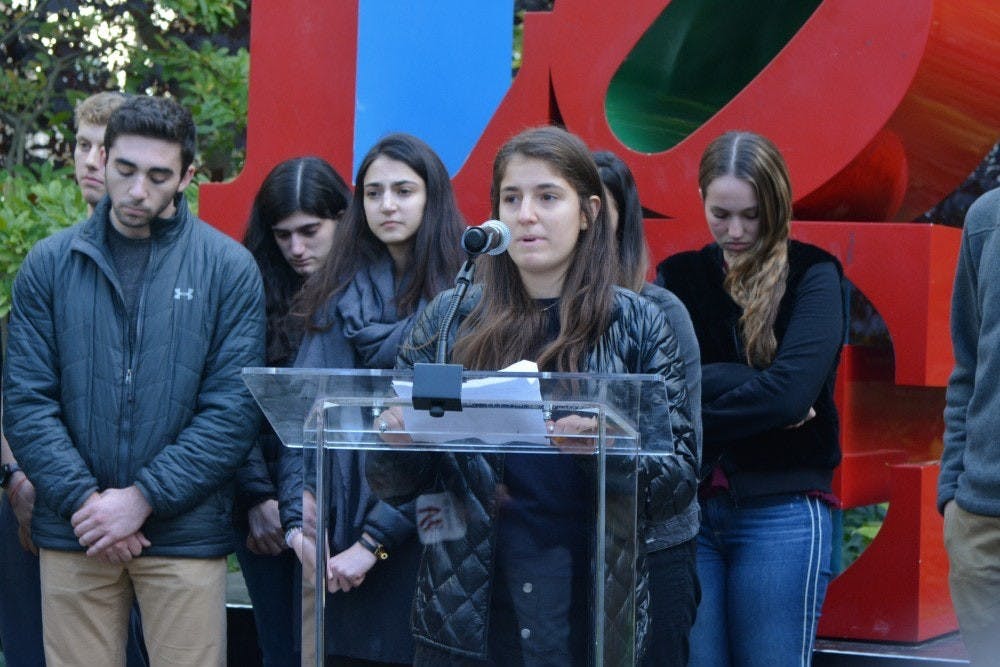On Saturday, October 27th, one of the greatest acts of anti–Semitism in American history occurred in Pittsburgh at the Tree of Life Synagogue, where eleven Jews were killed while they were observing Shabbat. The three co–presidents of Penn Hillel, Jeremy Wilson (C ’19), Jennifer Reiss (C ’19), and Samantha Brooks (W ’19) share their perspectives on the tragedy and how they plan to unite the Jewish community and the Penn community at large in the wake of this act of hate.
Samantha was at home in her apartment at Penn when the tragedy struck. She reflected that there were many levels of emotion she felt when she saw the shooting on the news.
“It’s just kind of one of those things where you feel awful in general because it’s a mass shooting, but it also has a whole other dimension of feeling like it attacked people who shared some part of your identity with you. So for me it was personally a lot,” Samantha says.
Samantha adds that the day after the tragedy, she had to go to the Hebrew School she teaches at and lead a discussion about it with fourth grade students.
“I had to help them cope with it before I had even coped with it myself,” Samantha says. “Different students were worried about security measures and how those might change and if they’re safe as Jews going out into the world. I had to reassure them that Judaism will continue to exist and continue to thrive even when awful anti–Semitic things happen.”
Jeremy recalls that he was observing Shabbat himself during the shooting. When he found out, he opened up his computer and was immediately touched by the overwhelming support from the school. He said he personally received an email from Amy Gutmann, Chaz Howard from the Office of the Chaplain, Student Intervention Services, Penn Police, the Muslim Student Association, and “a dozen other groups.”
Jennifer spoke at the vigil on campus and was overwhelmed by the support of the Penn community at large from both students and staff, Jews and non–Jews.
“I think being at the vigil was obviously such a sad time, but being there together with so many people from different backgrounds, faiths, and just so many different staff at Penn—it’s really important to know that we have that support group and we’re not alone,” Jennifer says.
Jennifer notes that Penn professor and Squirrel Hill native Howard Fineman spoke at the vigil. She was also very inspired by an article he wrote about the shooting that was recently published in The New York Times. Jennifer recalls that Fineman believes that while it is unfortunate that America still contains such acts of hate, these tragedies are the foundation for Jews to make the world a place of equal opportunity and free of discrimination.
This idea of unity despite difference is something all three students have felt through their involvement at Hillel and want a larger portion of the student body, both Jewish and non–Jewish, to connect with. They highlight that they each have different backgrounds within Judaism. Jeremy identifies as Modern Orthodox, for example, and keeps Kosher and observes Shabbat weekly. Jennifer and Samantha, on the other hand, are both Reform. They were excited to come to Penn and meet students such as themselves, who each have different relationships to Judaism. They also believe these differences are what make them so strong as the leaders of Penn Hillel.
“We’re kind of on different spectrums, and I actually think that works well for us,” Jennifer says.
Since the shooting, Jeremy explains that Penn Hillel has hosted many conversations, both large and small across Hillel and multiple student groups. He led many of these discussions, and the main thing he noticed was the variety of responses, ranging from the ways in which some students were grieving or not grieving about it and whether or not this tragedy should be used as a platform for various political matters such as gun control.
“Some people thought that changing their profile picture was a really effective response, other people thought that wasn’t doing anything,” Jeremy says. “Some people’s reactions were ‘Oh, some people are using this tragedy for their own personal agendas.’ Other people thought the event totally called for that and we should use this as an opportunity to call attention to real issues.”
Jen points out that another controversial point that was brought up during these conversations was the national #showupforshabbat campaign. While some students were in support of this effort, “Some people were saying we don’t need to start a hashtag campaign for those 11 lives that were lost,” Jennifer says.
“I think that was a core challenge that we felt was, ‘We need to be there for all students,’ but there are so many responses to it,” Jeremy adds.
When asked about what they hope to accomplish during their remaining time as co–presidents, Jeremy, Jennifer, and Samantha all shared the same vision: they want to make Hillel a place where all Jewish students of all denominations and the Penn community as a whole feel welcome and at home.
“I think the most important thing is making it an accessible space to everyone whether you identify as reconstructionist or you identify as orthodox, you should feel like there’s a place for you,” Samantha says. “You should also feel there’s a place for you if you’re not Jewish. We’re all about having open dialogue with all kinds of people and about promoting diversity, so I think my dream is to see Hillel actually be a space where all people feel welcome.”

